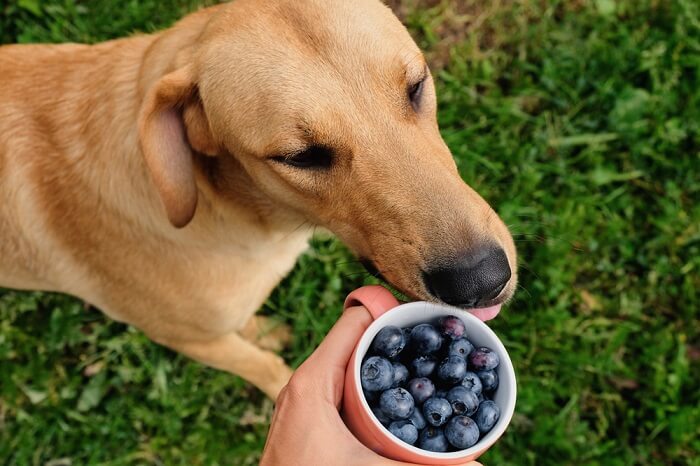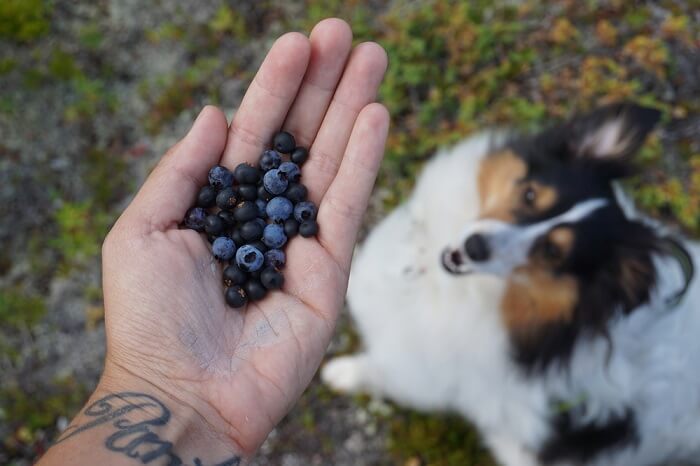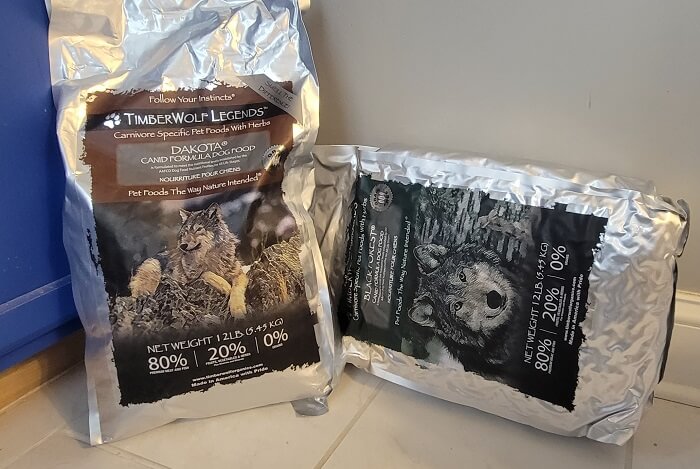Can Dogs Eat Blueberries?
This page contains affiliate links. We may earn money or products from the companies mentioned in this post through our independently chosen links, which earn us a commission. Learn More
Often called a “superfood” today, many people regularly add a serving of blueberries to their diet both for their delicious taste and for health reasons. But what about dogs? Can dogs eat blueberries?
And, are they good for dogs?
We won’t keep you in suspense. Yes, blueberries ARE good for dogs and many dogs love them.
Of course, there are some things about blueberries you should know before you start giving them to your dog, so read on.
Blueberry Nutrition Stats
Blueberries are small 0.2–0.6 inches (5–16 mm) in diameter, round, and range from blue to purple in color. There are different kinds of blueberries, such as the lowbush and highbush varieties, but their nutritional values are similar.
One cup (148 g) of blueberries is considered to be a serving size for a human. It contains the following:
- 84.4 calories
- 1.1 grams protein
- 0.5 grams fat
- 21.4 grams carbohydrates
- 3.6 grams dietary fiber
- Vitamin C 14.4 mg
- Vitamin K 28.6 mcg
- Manganese 0.5 mg
Blueberries Nutritional Facts At A Glance

Blueberries are very low in saturated fat, cholesterol, and sodium. They are a good source of dietary fiber and a very good source of vitamin C, vitamin K, and manganese. They also contain small amounts of vitamin E.
However, a large portion of the calories in blueberries come from sugars, though they are simple sugars such as glucose and fructose. Blueberries have a score of 53 on the glycemic index – the index that measures how quickly a food raises the blood sugar level. This is a relatively low score which means blueberries should not cause spikes in blood sugar for people with diabetes.
About 16 percent of the carbs in blueberries comes from fiber. One cup of blueberries provides 3.6 grams of fiber.
Blueberries are also a good source of antioxidants such as anthocyanins and flavonols and other beneficial plant compounds that are believed to help with heart disease, diabetes, and cancer.
You can see why so many people think that blueberries are a healthy food.
Can Dogs Eat Blueberries?
Yes, dogs can definitely eat blueberries. Many dog food companies today add blueberries to dog food for their antioxidant properties and as a source of fiber. Dogs also love them as a treat or snack.
They are low in calories with many health benefits. Blueberries do contain sugars, like other fruits and berries, so you shouldn’t let your dog pig out on them, but given in moderation, they are a healthy treat for your dog.
Are Blueberries Good for Dogs?
Blueberries are good for dogs, in moderation. The blueberries themselves pose no risk to your dog. They are high in vitamin C, vitamin K, and manganese and an excellent source of antioxidants and fiber.
Blueberries are also very small so there is little danger of them being a choking hazard unless your dog gulps down hundreds of them at one time. (It’s always possible to choke on anything in some situations.)
According to one pet insurance company, you also need to make sure you wash your blueberries before giving them to your dog because mold can be a problem. Washing them will also remove pesticides and dirt.
As always, if your dog has any underlying health issues, you should talk to your veterinarian before giving blueberries or any other food.
How Many Blueberries Can (Should) Dogs Eat?

How many blueberries you give your dog can depend on his size, age, and other factors. Eating too many can result in digestive upset such as diarrhea or a stomach ache.
Treats shouldn’t make up more than 10 percent of your dog’s daily calories. For example, a dog that weighs about 30 pounds needs some 800 calories per day. A cup of blueberries contains 84 calories.
That would be more than enough blueberries for that particular dog! In fact, it would be best to start out by giving your dog just a few blueberries to see how he likes them and if he has any stomach issues from eating them.
How Often Can Dogs Eat Blueberries?
If your dog really enjoys blueberries, try giving them two or three times per week. You can rotate them with other berries, fruits, or vegetables so your dog has a good variety of tastes and textures for snacks.
The Correct Diet Is Important
Dogs need to eat the correct diet for good health. This means that they require good quality protein and fat. Foods like blueberries should only be given as an occasional treat.
While there are many different ideas about good dog foods and different ways to feed dogs, your dog needs the following in his diet:
- Good Sources of Protein- All dogs need good sources of protein in their diet. Meat, fish, poultry, and eggs are all good sources of animal protein.
- Good Sources of Fat- Fat provides essential fatty acids (EFA) and helps distribute the fat soluble vitamins A, D, E, and K so your dog’s body can absorb them.
- Named Ingredients- Look for named ingredients in your dog’s food and avoid generic ingredients. The more specific the ingredient is, the better. Otherwise, you can’t be sure what you are feeding your dog.
- Low to Moderate Carbohydrates- Many dog foods are loaded with carbohydrates. This is true even with some good quality dog foods. Carbohydrates are not “bad” and they can be beneficial (dietary fiber can come from carbs, for example). But carbs should not be a substitute for protein.
- Avoid Artificial Colors, Preservatives, and Sweeteners- Artificial preservatives and colors/dyes have been linked to some health problems in humans and animals. You should try to avoid these ingredients in dog foods.
- AAFCO- AAFCO is the Association of American Feed Control Officials. AAFCO sets voluntary standards for pet food labeling. Look for foods that follow these minimum standards.
- Fresh Water- All dogs need easy access to fresh water unless they are ill or have some other reason to be temporarily kept away from water. For example, you might keep water from a puppy overnight while you are house training him.
What Are Other Healthy Alternatives to Blueberries In A Dog’s Diet?

Blueberries are a healthy treat but there are many other fruits and vegetables that can provide some of the same benefits. You should consider these foods as treats. Give them to your dog occasionally and in moderation.
Check with your veterinarian if your dog has any health issues and you are concerned about giving any of these foods.
- Apples
- Asparagus
- Bananas
- Bell pepper
- Broccoli
- Brussels sprouts
- Carrots
- Cauliflower
- Cranberries
- Cucumber
- Green beans
- Mangos
- Oranges
- Parsnip
- Pears
- Pineapple
- Pumpkin
- Strawberries
- Summer squash
- Sweet potato
- Tomatoes
- Zucchini
How Do You Give Your Dog Blueberries?
Most people like to give blueberries to their dogs “raw,” which means like they would come from the bush (after washing them). Dogs usually enjoy eating them this way. But there are lots of other ways to give your dog blueberries.
Blueberries are often used in dog cookie recipes, for example. You can easily add them to some plain yogurt (with or without some honey), pour into a muffin tin and freeze to make a cool treat for your dog.
You can also sprinkle blueberries into your dog’s regular dog food or mash the blueberries to mix with the food. This can be a good way to get picky eaters to eat their food.
You can also use frozen blueberries for some of these recipes. We do not recommend giving your dog most human foods that contain blueberries simply because they contain added sugar that is not good for your dog.
Conclusion
Can dogs eat blueberries? Absolutely. They are a healthy, low-calorie snack that most dogs enjoy. They are high in vitamin C, K, and manganese, as well as antioxidants and fiber. We do recommend that you talk to your veterinarian before giving your dog blueberries if he has any health issues, just to be safe.



